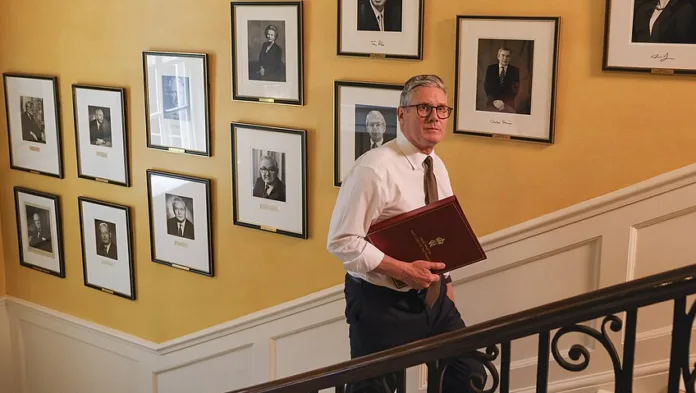The Prime Minister outlines key goals for the remainder of his term but faces questions over why reducing migration is not a priority
In a speech outlining his government’s “milestones” for the remainder of this parliament, Sir Keir Starmer promised significant changes but notably excluded migration from his list of priorities. The Prime Minister revealed six key targets Labour aims to achieve, emphasising their potential to drive forward the party’s mission and offer the public a way to hold the government accountable.
Starmer’s “Plan for Change” speech, delivered in Buckinghamshire, focused on advancing the government’s agenda without presenting it as a complete reset of policy. However, despite previous assertions from Labour that borders and the economy were their top priorities, reducing migration was conspicuously absent from the list.
When pressed by Sky News political editor Beth Rigby on why migration was not included, Starmer reiterated his commitment to reducing immigration. “It is our duty to do it [bring migration down]. And we will do it,” he stated, but stopped short of making it one of his six immediate priorities. This answer left many questioning the government’s stance on one of the most contentious issues in UK politics.
Embed from Getty ImagesWhile Starmer has frequently stated that controlling migration is essential, his failure to include it among the key milestones has sparked criticism, particularly from those who believe the Labour leadership has softened its position on border control. The decision to focus on other areas, while seemingly avoiding a direct commitment to tackle migration, could be seen as an attempt to avoid further polarising voters ahead of future elections.
Starmer’s broader focus includes economic growth, reducing inequality, and bolstering public services, with a clear commitment to economic stability. Labour’s plans for the future aim to build a more robust economy, but questions linger about how migration will be addressed in the long term.
The exclusion of migration from the key milestones also raises questions about Labour’s handling of one of the most pressing issues facing the UK. Migration remains a hot-button topic for many voters, and not including it in the list could either defuse potential tension or leave the government vulnerable to accusations of evading the issue.
THE GUARDIAN
Prime Minister Keir Starmer delivered a significant speech accusing Whitehall of “comfortably” accepting failure and setting the stage for the Labour government’s next phase. He unveiled six key milestones for his administration, including targets for economic growth, housing, and public services. These included 1.5 million new homes, 95% clean power by 2030, and improved NHS standards. However, the omission of immigration as a key milestone and concerns over diluted promises—such as a reduced clean power target—sparked backlash from critics, with accusations of Labour “watering down” ambitious goals.
THE TELEGRAPH
In a significant policy shift, Prime Minister Keir Starmer has diluted key manifesto pledges, including the goal of 100% low-carbon energy by 2030, now reduced to 95%, and the pledge to make the UK the fastest-growing G7 economy, which is now merely an “aim.” The changes come amid signs of economic strain following the tax increases in his recent budget. Additionally, his new blueprint, the “Plan for Change,” lacks specific targets on migration, small boat crossings, and tackling welfare-related sickness, with some of the proposals already facing criticism for being less ambitious than originally promised.
